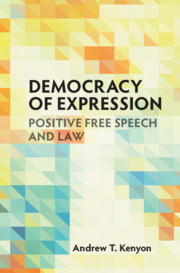Description
Democracy of Expression
Positive Free Speech and Law
Author: Kenyon Andrew T.
Language: English
Subject for Democracy of Expression:
Approximative price 35.47 €
In Print (Delivery period: 14 days).
Add to cart
Democracy of Expression
Publication date: 06-2021
250 p. · 23x15 cm · Paperback
Publication date: 06-2021
250 p. · 23x15 cm · Paperback
Approximative price 109.04 €
In Print (Delivery period: 14 days).
Add to cart
Democracy of Expression
Publication date: 06-2021
250 p. · 23.5x15.5 cm · Hardback
Publication date: 06-2021
250 p. · 23.5x15.5 cm · Hardback
Description
/li>Contents
/li>Biography
/li>
Free speech has positive dimensions of enablement and negative dimensions of non-restraint, both of which require protection for democracy to have substantial communicative legitimacy. In Democracy of Expression, Andrew Kenyon explores this need for sustained plural public speech linked with positive communicative freedom. Drawing on sources from media studies, human rights, political theory, free speech theory and case law, Kenyon shows how positive dimensions of free speech could be imagined and pursued. While recognising that democratic governments face challenges of public communication and free speech that cannot be easily solved, Kenyon argues that understanding the nature of these challenges (including the value of positive free speech) at least makes possible a democracy of expression in which society has a voice, formulates judgments, and makes effective claims of government. In this groundbreaking work, Kenyon not only reframes how we conceptualize free speech, but also provides a roadmap for reform.
Preface; 1. Introduction; 2. Positive Free Speech from Media Studies and Law; 3. Positive Free Speech and Democracy; 4. Positive Human Rights and Political Freedom; 5. US Legal Writing on Positive Free Speech; 6. German Broadcasting Freedom; 7. French Freedom of Communication and Pluralism; 8. Framing Communicative Freedom; Index.
Andrew T. Kenyon is Professor at Melbourne Law School, University of Melbourne. He researches in comparative media law, drawing on media related disciplines as well as law. His publications include Comparative Defamation and Privacy Law (edited, 2016) and Positive Free Speech: Rationales, Methods and Implications (co-edited with Andrew Scott, 2020).
© 2024 LAVOISIER S.A.S.




